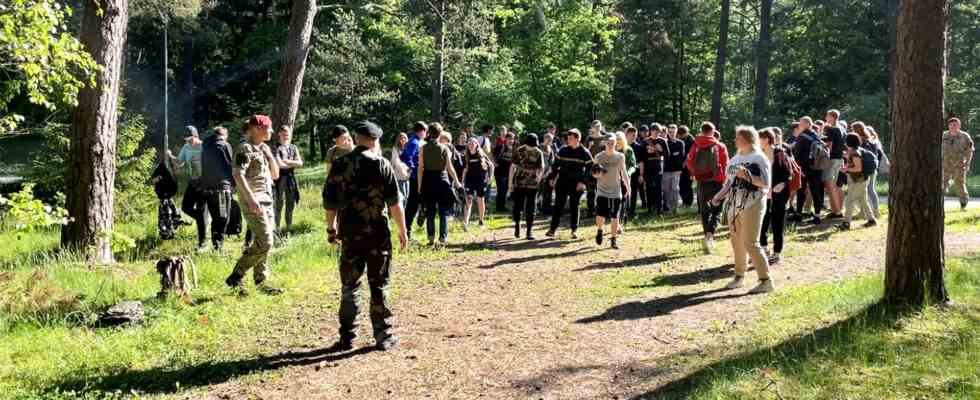Status: 06/27/2022 11:05 a.m
Treating serious wounds, setting up camouflage tents and paying attention to the underground: Against the background of the Ukraine war, schoolchildren in Lithuania learn how to protect and defend themselves in an emergency.
Instead of going to the classroom, she goes out into the countryside in the morning: around 100 high school students in the Lithuanian coastal town of Klaipėda march through the forest. They are 15 and 16 years old. A hiking trip, you might think – but it’s an exercise for emergencies.
The Lithuanian militia takes command today. Men in camouflage clothing first show the young people how serious wounds on the limbs are treated. Justina Gelminauskaite Gellminauskije practices with her friends how to put on a tourniquet. “We have to tie the tourniquet quickly to stop the bleeding. That’s the only way we can save lives in an emergency. It worked well in our team, we’ll definitely get first place,” says Justina.
No lessons for fun
It seems like a game, but the Lithuanian Riflemen’s Union does not organize these classes for fun. The paramilitary militia is closely linked to the Lithuanian army, but pays for equipment and exercises itself.
Men like Sarunas Vaiciulis are always ready to defend their country. The squad needs youngsters. A camouflage tent should be set up and make the students want more. “The students learn how to protect themselves from the rain and cold. And what kind of ground they should choose in winter so as not to freeze to death when they have to spend the night in the forest one day as young shooters. Fir branches, for example, are good because they repel the cold,” says Vaiciulis from the voluntary rifle club.
Every exercise is about speed. And the speech is also different than in the classroom: “It has to be done much faster there, the time is up and the tent isn’t up yet either! You have to do some follow-up work,” encourages Vaiciulis.
Hidden survival packs in different locations
15-year-old Justina and her friends still have their problems. The training is still much better than many a day of class. “It’s not that easy. But when things get serious, we can put this knowledge to good use here,” Justina is certain.
Justina is sure that she can put the knowledge to good use.
Image: Christian Blenker
The teenagers also sense that something has changed since Russia’s war against Ukraine. The mood is tense, many Lithuanian families have a plan for emergencies, says Vaiciulis. “I’ve taken precautions. I’ve stored survival kits in various places. We have plans where we would meet up with the family if we too are attacked. We don’t just have the danger from one side. We have the Kaliningrad exclave on the on the one hand and Belarus on the other. Russia itself is not far either. People are concerned.”
Pilot project in ten schools
After the last exercise, the students receive their certificates. Justina goes home satisfied and proudly shows her good result to her mother Kristina Gelminauskaite. She likes the fact that her 15-year-old daughter is being taught by the Lithuanian militia:
It is important that children learn in school how to defend their homeland and how to deal with critical situations. From an early age they need training, I think. It should be taught from the first grade so that in the future we will have people who are strong and who can defend their country.
This teaching is still being tested as a pilot project at ten schools, but could eventually become a compulsory subject for everyone. In any case, Justina has already convinced the Lithuanian militia. She also thinks that it is important that everyone can make a contribution – if it should come down to it.
Lithuania: Defense as a subject
Sofie Donges, NDR, 26.6.2022 7:28 a.m

